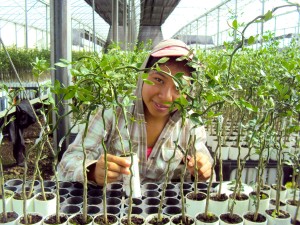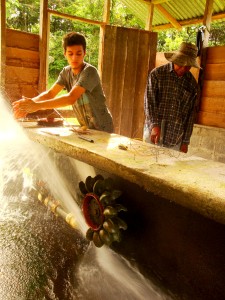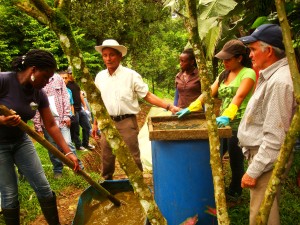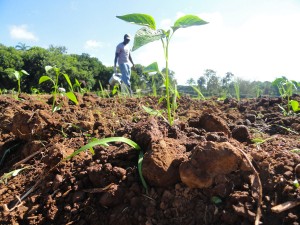How the classroom looks when you remove the walls
From their first day of classes at the University, EARTH students put on boots and head out into the fields. Whether it’s starting and running a real business; working in the communities surrounding the campus; or doing a four month internship with a company, the experiential educational model puts EARTH students in the driver’s seat of their learning. Every day they face real problems, apply their knowledge and pursue their interests, producing a level of capacity rarely seen in recent college graduates.
Through the camera lens, four students give us a view into their world of lived experience and transformative learning.
Alejandro Fernández
(‘14, México)
“There are things that don’t come in books, for example how you sweat below the sun in a sugar-cane plantation; the cuts that you get from the sugar cane leaves if you don’t wear protective clothing; how rain or a storm can bring field labor to a stop. A book only teaches you to take five samples distributed throughout the plantation, but it won’t tell you how difficult it is to walk when the cane is cut down and there are ants or snakes in the path,” he remarks.
He continues: “The abilities and skills you acquire with field practice turns you into a professional who will change society, because it gives you the knowledge of how things really are.”
Lucía Fernández
(‘16, Bolivia)
For Lucía, a first-year student, the University opens up learning opportunities far beyond the walls of the classroom. In her free time she likes to learn more about her areas of interest and share knowledge with her classmates. Through Gustavo Angulo (’14, Costa Rica), she had the opportunity to visit the farm of retired EARTH professor Panfilo Tabora.
“The professor knows Gustavo and invited us to spend the weekend on his farm. This is what the University has…even out of the classroom you can learn. In addition to teaching classes, professors have many projects that you can get involved with and learn from,” reflects Lucía.
She continues: “This photo was taken in Professor Tabora’s home, and is a hydro electric generator. With the force of gravity, spring water flows through a small hose, generating enough pressure to move this mill and generate electricity for his house. The water shooting out [in this photo] wasn’t positioned well and was not turning the mill. We were trying to see how to solve the problem.”
#2
Earlier this year, Lucia and her first-year classmates participated in “Integration Week”—a full week of special activities that includes workshops, mini-internships, and field and community visits. During the week, she visited a pepper farmer in a nearby community. The experience gave students an opportunity to expand their knowledge about bio-digesters as a way to generate cooking gas.
“Until then we hadn’t yet seen a lot about bio-digesters. We knew about them, but that was the first time we put on our gloves and worked with this technology; some mixing and others straining, preparing the raw material to feed the bio-digester,” she explains.
For Lucía, being able to work in the community and learn from people with more experience in farm work is an added value that the University offers.
“Something I really like about the University is the experiential learning, but also that you have a guide who can be a professor, a staff member, even a producer; you learn directly from people who have been doing this for years,” she relates.
María Isabel Coloma
(‘16, Guatemala)
“I took this photograph in the first trimester when for the first time in my life I had the experience of planting so much. It was very exciting to me, my first opportunity to work in the field; to watch something germinate and grow. The person in the photo was an accident. I was taking the photo of the plant and one of my classmates entered the frame. It was very natural. This is the reality of experiential work at EARTH. It’s not something that is posed.”
Isabel dreams of returning to Guatemala and developing an agricultural project that will involve at-risk youth. She believes that she can structure the project during her three remaining years at the University so that it is ready to implement upon graduation.









Excelente labor, felicitaciones y éxitos a las futuras generaciones del cambio!